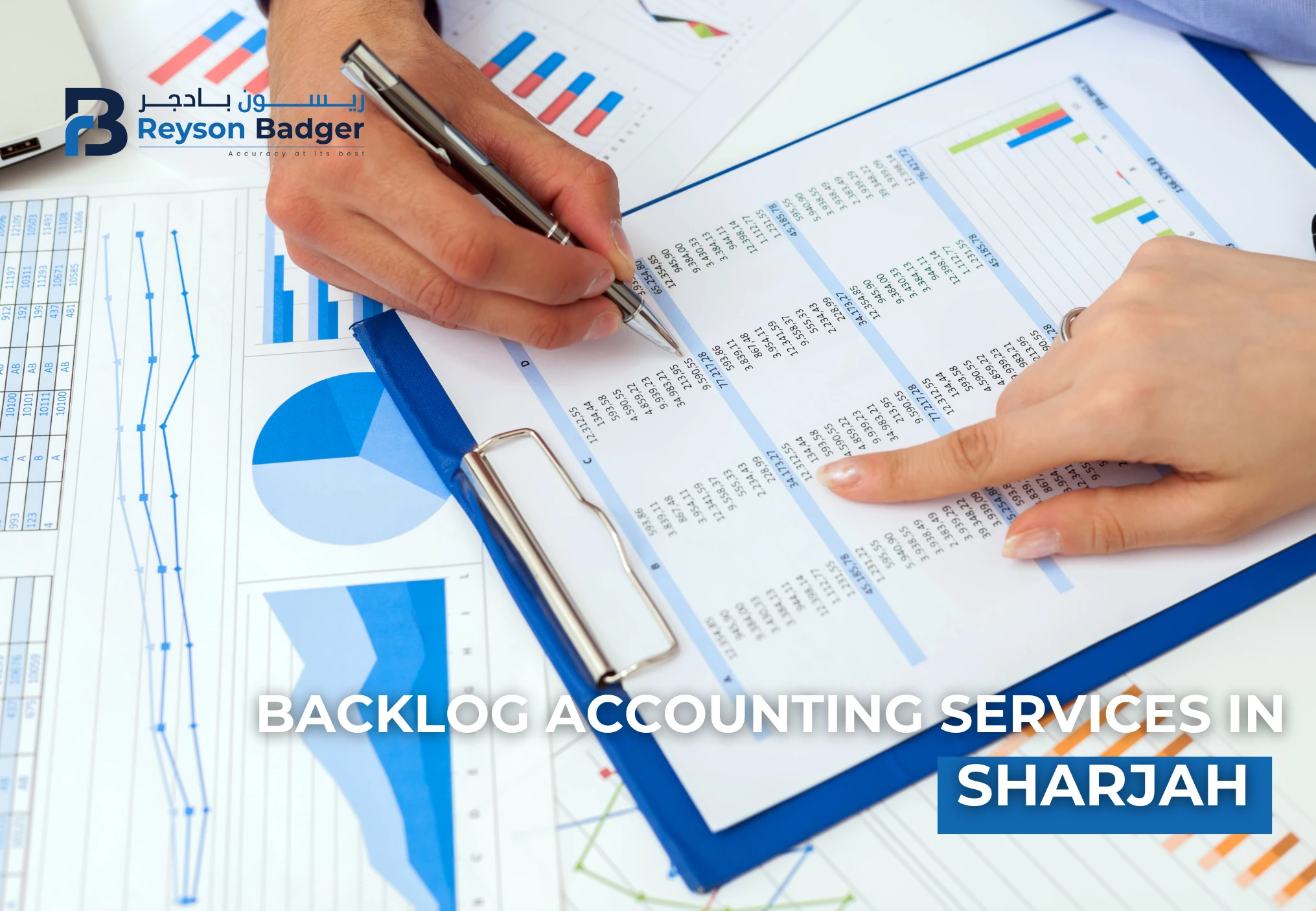Backlog Accounting Sharjah
Backlog accounting in Sharjah refers to updating financial records by organizing and entering previously unrecorded transactions. This practice ensures that all financial information is accurate and current, allowing businesses to maintain clear documentation of their activities. In Sharjah, backlog accounting helps identify record discrepancies, improving overall financial decision-making. It also assists companies in meeting regulatory requirements, minimizing the risk of penalties for late or incomplete reporting.

Backlog accounting is crucial for businesses in Sharjah, as it plays a significant role in maintaining accurate financial records and ensuring compliance with local regulations. This procedure results in trustworthy financial reporting, promoting clear communication with stakeholders and investors. By keeping current financial records, companies can achieve economic well-being, leading to better decision-making and strategic planning for future expansion. Maintaining a backlog accounting system is essential for upholding a company's financial credibility and promoting its expansion in Sharjah.
Our Backlog Accounting Services in Sharjah
Our backlog accounting services in Sharjah are designed to help businesses efficiently manage and update their financial records. We offer customized solutions to ensure accuracy, compliance, and timely reporting, enabling your business to succeed. Below are the various forms of backlog accounting services:

- Sales Backlog Accounting: Sales backlog accounting manages unfulfilled orders, tracking their impact on revenue and cash flow. A strong backlog indicates demand, but excessive delays can frustrate customers. Businesses should monitor sales backlog ratios to balance demand with operational capacity.
- Purchase Backlog Accounting: Purchase backlog accounting tracks suppliers' pending orders to ensure enough inventory. By managing these orders well, businesses can avoid production delays and improve inventory turnover.
- Work-in-Progress (WIP) Backlog Accounting: WIP backlog accounting tracks the value of unfinished items in production, which is crucial for manufacturers to assess production efficiency and resource use. By monitoring work in progress, businesses can spot delays and make adjustments to improve efficiency and reduce delivery times
- Backlog Accounting for Accounts Receivable (AR): Backlog accounting for accounts receivable (AR) tracks unpaid invoices and outstanding payments owed to a company. It monitors the total value of unpaid invoices and their impact on cash flow. Effective AR backlog management helps identify overdue accounts, prioritize collections, and follow up with customers on time.
- Accounts Payable (AP) Backlog Accounting: AP backlog accounting involves managing unpaid invoices from suppliers. This service keeps track of outstanding payments to ensure firms pay their vendors on time. By efficiently managing delayed accounts payable, firms can enhance cash flow. It also aids in preventing late fees and maintains advantageous credit terms.
Steps Involved in Backlog Accounting

Step 1: Initial Assessment
Analyzing the extent of the backlog is the initial stage in backlog accounting. This involves determining how much data is missing and recognizing the vital documents required for precise record-keeping, such as invoices, receipts, and bank statements.
Step 2: Data Collection and Reconciliation
After reviewing the backlog, the next step is to collect financial documents, like internal files and vendor invoices. This may involve contacting suppliers or banks for statements. Once gathered, it’s important to check bank and vendor reconciliations to ensure records match and fix any discrepancies.
Step 3: Recording and Posting Transactions
After collecting and reviewing the necessary data, the next step is to enter the missing transactions into the accounting system. This means accurately posting them to the right accounts in the general ledger, and making sure the dates and amounts are correct.
Step 4: Financial Statement Preparation
After documenting all transactions, the next step is to create financial statements for the backlog period. This includes balance sheets, profit and loss statements, and cash flow reports. These give a clear view of the company's finances during the backlog period and help assess performance.
Step 5: Final Review and Corrections
The final step is auditing backlog records to ensure accuracy and compliance with accounting standards. This review identifies errors in financial data, allowing corrections before finalizing. The final evaluation confirms the completion of backlog accounting and accurately reflects the company's financial health.
By following these steps, businesses can effectively manage their backlog accounting, ensuring accurate and timely financial reporting that supports better decision-making and compliance with regulatory requirements
.
Reasons for Accumulated Backlogs
- Inefficient Accounting Systems: Outdated or poorly designed systems can slow down transaction processing, leading to errors and delays that create backlogs.
- Lack of Resources or Expertise: Lack of staff or underqualified personnel may lead to missed deadlines and poor financial documentation management.
- Business Growth Exceeds Record-Keeping: Rapid expansion can increase transaction volumes beyond the capacity of current accounting processes, resulting in backlogs.
- Changes in Regulations: Frequent changes in regulations can burden businesses that are not ready, leading to confusion and delays in compliance that create backlogs.
- Poor Technology Integration: Poor technology integration between accounting software and other business systems can lead to disconnected data, causing inefficient data management and slow processing times.
- Complex Business Structures: Businesses with complicated structures, like branches or joint ventures, may struggle to combine their financial information.
- Data Quality Issues: Poor or incomplete data can slow down accounting processes and cause mistakes and delays.
Essential Reports for Backlog Accounting Updates
When updating backlog accounts, several key financial reports are generated to ensure that the company's financial data is up-to-date, accurate, and compliant with regulatory requirements. These reports provide a clear picture of the business's financial health for the backlog period and ensure that all stakeholders can make informed decisions. Here are the essential reports generated during the backlog accounting process:
- Income Statement (Profit & Loss Statement):
This report shows the company’s income, expenses, and profits or losses during the backlog period, giving you a simple view of how the business has done and its profitability.
- Balance Sheet:
Shows the company's financial status at a particular moment, outlining assets, liabilities, and equity to give an overview of its stability and ability to meet financial requirements.
- Cash Flow Statement:
Tracks the cash coming in and going out from operations, investments, and financing activities, helping you see how well the company manages its cash flow and liquidity.
- Accounts Payable:
This report lists all outstanding bills to suppliers, organized by how long they’ve been unpaid, helping you stay on top of payments.
- Accounts Receivable:
The Accounts Receivable report outlines the unpaid invoices and the amounts customers owe to the company. Updating this report requires reconciling overdue invoices and ensuring that all receivables are correctly recorded and handled.
- Sales Performance Report
The Sales Performance Report looks at how much revenue the company makes and tracks sales trends over time. It updates backlog data to show how well sales have done and helps plan future strategies.
- Financial Ratio Analysis
Financial ratios like liquidity, profitability, and solvency give a snapshot of a company’s financial health. These ratios are recalculated when updating backlog accounts to ensure they accurately reflect the company’s current status.
- Working Capital Analysis
This report checks if the company can pay its short-term bills using its current assets. It updates by reviewing and adjusting accounts related to assets and liabilities, giving a clear picture of the company’s working capital.
- Break Even Analysis
Break-even Analysis calculates the sales needed to cover costs and start making a profit. It provides a more accurate view of when the company will break even by using updated backlog data.
Why Timely Backlog Accounting is Essential
- Up-to-date financial information aids informed decision-making.
- Regular reporting improves cash flow management and overall financial health.
- Current records reduce audit risks and avoid penalties for tax issues.
- Accurate statements attract investors and establish business value in sales.
- Timely accounting highlights sales trends, enabling proactive profit-boosting changes.
- Updated records build trust with stakeholders like banks and investors.
- Clear financial insights identify growth opportunities and help allocate resources.
- Current records ensure smoother operations and reduce errors.
- Managing backlog accounting ensures compliance and minimizes legal risks.
How to Prevent Future Backlog Accounting Issues?
- Regular audits and reviews: it keeps financial records up to date and accurate, identifying possible concerns before they become backlogged.
- Training and education: Staff receive regular training on compliance and accounting best practices, which provides them with the information and skills required to maintain correct records and comply with rules, lowering the chance of errors.
- Automation: Integrating automated accounting systems simplifies operations and reduces the possibility of manual errors and delays, making it easier to keep financial records current and correct.
Backlog Accounting Services in Sharjah, UAE
Using backlog accounting services in the UAE helps businesses comply with local regulations, avoiding fines and legal issues. These services provide expert insights that improve financial clarity, leading to better decision-making. By simplifying financial operations, backlog accounting reduces inefficiencies and saves time and money. Keeping records current shows commitment to transparency and builds trust with investors. Professional backlog accounting allows businesses to focus on growth while specialists handle financial challenges.
At Reyson Badger, we offer reliable, high-quality backlog accounting services for businesses. Our experienced team knows the challenges firms face, especially in meeting local regulations in the UAE. We use advanced accounting technologies to keep financial records accurate and minimize errors. What makes us different is our personalized service. We take the time to learn about each client's needs and provide insights that help them make informed business decisions. With Reyson Badger managing their finances, clients can focus on growing their business, confident that their financials are in expert hands.

